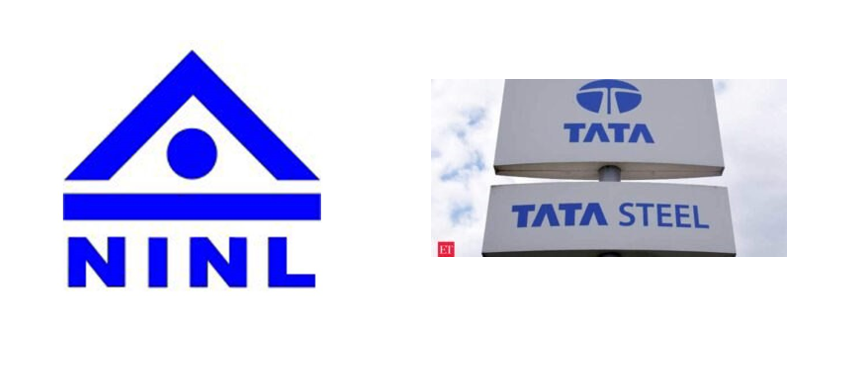Report by Kamgar Ekta Committee (KEC) correspondent
Again and again, it is getting proven that the policy of privatisation is being pursued at the instance of big monopoly capitalists for their benefit by selling assets built with public money and workers’ labour. All other arguments given by government for justification of disinvestment are false.
 The strategic sale of Neelachal Ispat Nigam Limited (NINL) to Tata Steel Long Products Ltd. was approved by the government on 31 January 2022 at enterprise value of Rs 12,100 crore only. After selling Air India to the Tata group in October at a throw away price in October 2021, now another company is being sold to them.
The strategic sale of Neelachal Ispat Nigam Limited (NINL) to Tata Steel Long Products Ltd. was approved by the government on 31 January 2022 at enterprise value of Rs 12,100 crore only. After selling Air India to the Tata group in October at a throw away price in October 2021, now another company is being sold to them.
NINL is a joint venture of 4 CPSEs, namely MMTC Ltd., NMDC Ltd., Bharat Heavy Electricals Ltd. (BHEL), MECON Ltd. and two Odisha Govt. PSUs, namely Odisha Mining Corporation Ltd (OMC) and Industrial Promotion & Investment Corporation Ltd. (IPICOL). NINL is a integrated steel plant with annual capacity of 1.1 Million Tonne, at Kalinganagar in Jajpur district of Odisha. NINL has its own captive power plant to meet the internal power requirement and also has an air separation unit for producing oxygen, nitrogen and argon. NINL has its own captive iron ore mine. NINL has become India’s largest exporter of pig iron since 2004-05. The “KAMDHENU” fertilizer; ammonium sulphate produced by NINL was in high demand in nearby areas.
NINL always made operating profit and made net profit up to 2011-12. Due to low equity infusion, insufficient cash flow, want of fund for repair/modernization/expansion, irregular/inadequate supply of raw materials, purchase of raw material at high price, overburden of liabilities & interest resulting in low-capacity utilization and high production cost, restricted production & product mix as per market demand were reasons for its losses in the subsequent years. NINL could never utilize its full capacity for the reasons mentioned above. NINL has tremendous potential but never got realized.
NINL possesses 2500 acres of litigation free land. Mining lease was granted to NINL in 1999. Mining Lease of 874.29 Hectare area with approx. reserve of 110 million tonne iron is of good quality ore having 65% Fe content. Mining Lease was granted in 2009 for 50 years. To get all clearances for mines about 2 decades were spent. All the necessary/statutory clearances were obtained after NINL sale was approved.
The government gave the approval for strategic sale of NINL on 8 January 2020. The plant operation was shut down permanently in March 2020, citing large accumulated losses as a reason but much before its strategic disinvestment was recommended by a High-power Committee in the Ministry Of Commerce in 2018 itself.
The privatisation of NINL is yet another case of deliberate wrecking of a company to justify its privatisation. In spite of having captive mines NINL had to buy iron ore from MMTC at market price, which made it a loss-making company. As a result NINL has straight way incurred loss more than Rs.1500 Cr towards procurement of Iron Ore.
It is well known that a running plant will fetch much higher price than a shut down plant. Steel prices touched one of the highest levels in 2021 and every steel company made large profit but the NINL was not allowed to resume production. It is evident that all attempts were made by the government to sell it at any cost and sell it cheaply to benefit big steel corporate.
Now that captive mine is ready to supply iron ore which would make NINL a profitable company, it is being sold.
The conservative value of the land possessed by NINL itself is around Rs 2,500 crore. The land is sufficient to increase the production capacity to 5 million tonnes. It is safe to assume that Tata Steel will expand the capacity immediately using the existing infrastructure.
Captive iron ore mine of NINL is yet another valuable asset. At annual production of 10 million tonnes of iron ore, the value of iron ore alone at current price works out to Rs 8,500 crore.
The sale has put the fate of 1350 workers and 350 executives at stake as the government has stipulated that the present employees be retained for one year, which of course means Tata Steel would be free to remove them after 1 year.
Again and again, it is getting proven that the policy of privatisation is being pursued at the instance of big monopoly capitalists for their benefit by selling assets built with public money and workers’ labour. All other arguments given by government for justification of disinvestment are false.
